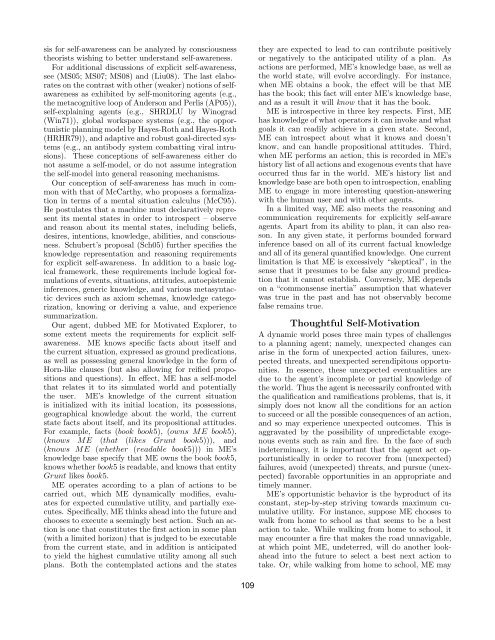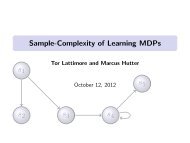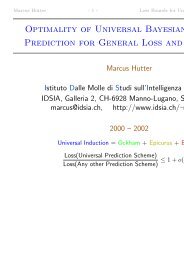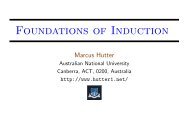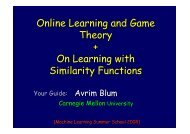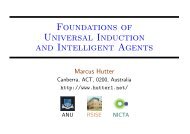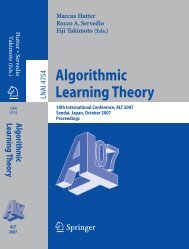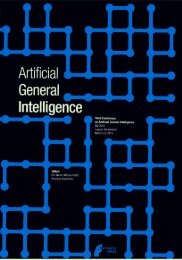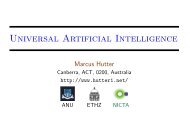A Framework for Evaluating Early-Stage Human - of Marcus Hutter
A Framework for Evaluating Early-Stage Human - of Marcus Hutter
A Framework for Evaluating Early-Stage Human - of Marcus Hutter
You also want an ePaper? Increase the reach of your titles
YUMPU automatically turns print PDFs into web optimized ePapers that Google loves.
sis <strong>for</strong> self-awareness can be analyzed by consciousness<br />
theorists wishing to better understand self-awareness.<br />
For additional discussions <strong>of</strong> explicit self-awareness,<br />
see (MS05; MS07; MS08) and (Liu08). The last elaborates<br />
on the contrast with other (weaker) notions <strong>of</strong> selfawareness<br />
as exhibited by self-monitoring agents (e.g.,<br />
the metacognitive loop <strong>of</strong> Anderson and Perlis (AP05)),<br />
self-explaining agents (e.g., SHRDLU by Winograd<br />
(Win71)), global workspace systems (e.g., the opportunistic<br />
planning model by Hayes-Roth and Hayes-Roth<br />
(HRHR79)), and adaptive and robust goal-directed systems<br />
(e.g., an antibody system combatting viral intrusions).<br />
These conceptions <strong>of</strong> self-awareness either do<br />
not assume a self-model, or do not assume integration<br />
the self-model into general reasoning mechanisms.<br />
Our conception <strong>of</strong> self-awareness has much in common<br />
with that <strong>of</strong> McCarthy, who proposes a <strong>for</strong>malization<br />
in terms <strong>of</strong> a mental situation calculus (McC95).<br />
He postulates that a machine must declaratively represent<br />
its mental states in order to introspect – observe<br />
and reason about its mental states, including beliefs,<br />
desires, intentions, knowledge, abilities, and consciousness.<br />
Schubert’s proposal (Sch05) further specifies the<br />
knowledge representation and reasoning requirements<br />
<strong>for</strong> explicit self-awareness. In addition to a basic logical<br />
framework, these requirements include logical <strong>for</strong>mulations<br />
<strong>of</strong> events, situations, attitudes, autoepistemic<br />
inferences, generic knowledge, and various metasyntactic<br />
devices such as axiom schemas, knowledge categorization,<br />
knowing or deriving a value, and experience<br />
summarization.<br />
Our agent, dubbed ME <strong>for</strong> Motivated Explorer, to<br />
some extent meets the requirements <strong>for</strong> explicit selfawareness.<br />
ME knows specific facts about itself and<br />
the current situation, expressed as ground predications,<br />
as well as possessing general knowledge in the <strong>for</strong>m <strong>of</strong><br />
Horn-like clauses (but also allowing <strong>for</strong> reified propositions<br />
and questions). In effect, ME has a self-model<br />
that relates it to its simulated world and potentially<br />
the user. ME’s knowledge <strong>of</strong> the current situation<br />
is initialized with its initial location, its possessions,<br />
geographical knowledge about the world, the current<br />
state facts about itself, and its propositional attitudes.<br />
For example, facts (book book5), (owns ME book5),<br />
(knows ME (that (likes Grunt book5))), and<br />
(knows ME (whether (readable book5))) in ME’s<br />
knowledge base specify that ME owns the book book5,<br />
knows whether book5 is readable, and knows that entity<br />
Grunt likes book5.<br />
ME operates according to a plan <strong>of</strong> actions to be<br />
carried out, which ME dynamically modifies, evaluates<br />
<strong>for</strong> expected cumulative utility, and partially executes.<br />
Specifically, ME thinks ahead into the future and<br />
chooses to execute a seemingly best action. Such an action<br />
is one that constitutes the first action in some plan<br />
(with a limited horizon) that is judged to be executable<br />
from the current state, and in addition is anticipated<br />
to yield the highest cumulative utility among all such<br />
plans. Both the contemplated actions and the states<br />
109<br />
they are expected to lead to can contribute positively<br />
or negatively to the anticipated utility <strong>of</strong> a plan. As<br />
actions are per<strong>for</strong>med, ME’s knowledge base, as well as<br />
the world state, will evolve accordingly. For instance,<br />
when ME obtains a book, the effect will be that ME<br />
has the book; this fact will enter ME’s knowledge base,<br />
and as a result it will know that it has the book.<br />
ME is introspective in three key respects. First, ME<br />
has knowledge <strong>of</strong> what operators it can invoke and what<br />
goals it can readily achieve in a given state. Second,<br />
ME can introspect about what it knows and doesn’t<br />
know, and can handle propositional attitudes. Third,<br />
when ME per<strong>for</strong>ms an action, this is recorded in ME’s<br />
history list <strong>of</strong> all actions and exogenous events that have<br />
occurred thus far in the world. ME’s history list and<br />
knowledge base are both open to introspection, enabling<br />
ME to engage in more interesting question-answering<br />
with the human user and with other agents.<br />
In a limited way, ME also meets the reasoning and<br />
communication requirements <strong>for</strong> explicitly self-aware<br />
agents. Apart from its ability to plan, it can also reason.<br />
In any given state, it per<strong>for</strong>ms bounded <strong>for</strong>ward<br />
inference based on all <strong>of</strong> its current factual knowledge<br />
and all <strong>of</strong> its general quantified knowledge. One current<br />
limitation is that ME is excessively “skeptical”, in the<br />
sense that it presumes to be false any ground predication<br />
that it cannot establish. Conversely, ME depends<br />
on a “commonsense inertia” assumption that whatever<br />
was true in the past and has not observably become<br />
false remains true.<br />
Thoughtful Self-Motivation<br />
A dynamic world poses three main types <strong>of</strong> challenges<br />
to a planning agent; namely, unexpected changes can<br />
arise in the <strong>for</strong>m <strong>of</strong> unexpected action failures, unexpected<br />
threats, and unexpected serendipitous opportunities.<br />
In essence, these unexpected eventualities are<br />
due to the agent’s incomplete or partial knowledge <strong>of</strong><br />
the world. Thus the agent is necessarily confronted with<br />
the qualification and ramifications problems, that is, it<br />
simply does not know all the conditions <strong>for</strong> an action<br />
to succeed or all the possible consequences <strong>of</strong> an action,<br />
and so may experience unexpected outcomes. This is<br />
aggravated by the possibility <strong>of</strong> unpredictable exogenous<br />
events such as rain and fire. In the face <strong>of</strong> such<br />
indeterminacy, it is important that the agent act opportunistically<br />
in order to recover from (unexpected)<br />
failures, avoid (unexpected) threats, and pursue (unexpected)<br />
favorable opportunities in an appropriate and<br />
timely manner.<br />
ME’s opportunistic behavior is the byproduct <strong>of</strong> its<br />
constant, step-by-step striving towards maximum cumulative<br />
utility. For instance, suppose ME chooses to<br />
walk from home to school as that seems to be a best<br />
action to take. While walking from home to school, it<br />
may encounter a fire that makes the road unnavigable,<br />
at which point ME, undeterred, will do another lookahead<br />
into the future to select a best next action to<br />
take. Or, while walking from home to school, ME may


